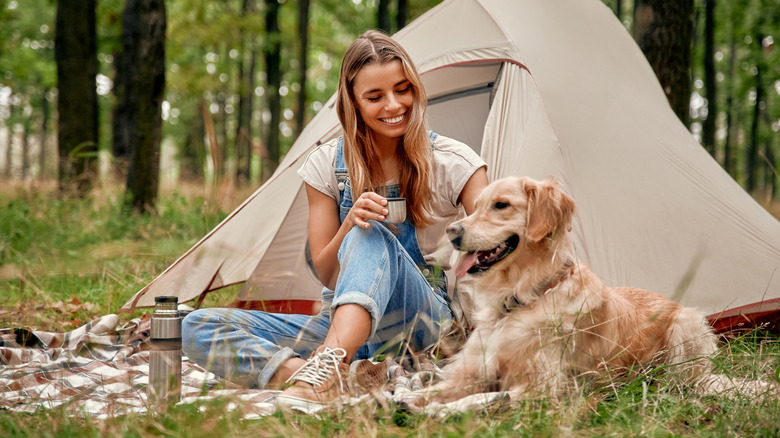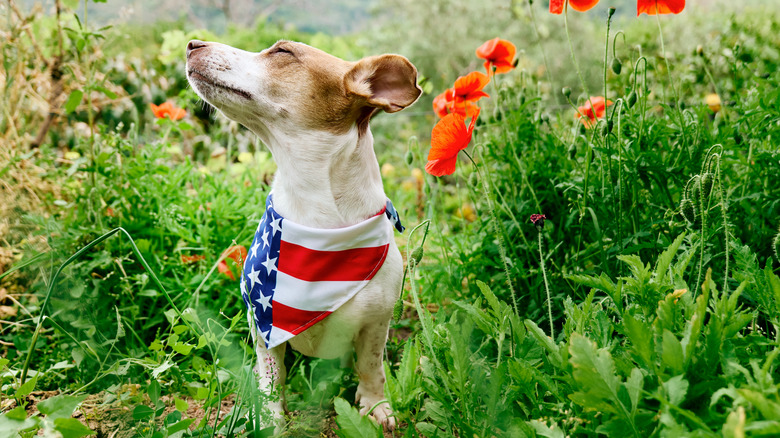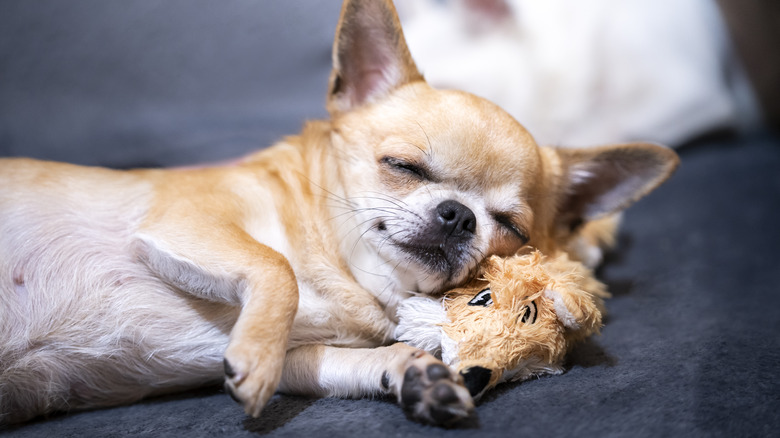How To Have A Fun July 4th Camping Weekend With A Dog Who Hates Fireworks
To most people, the Fourth of July weekend is meant to be a time for backyard barbecues, poolside parties, and patriotic parades. However, for dog owners, the holiday comes with a lot more stress than joy. From loud firework displays to overcrowded celebrations, these overwhelming experiences can turn even the most confident pups into an anxious, trembling mess who'll spend the entire weekend hiding or pacing nervously around the house. After all, dogs experience fireworks much differently than we do — and their sharp sense of hearing means that those distant booms actually sound a lot closer and more threatening to them. Throw in the unpredictable nature of these sounds — combined with the bright flashes and unfamiliar smells — and it's enough chaos to create the perfect storm of sensory overload for your furry friend.
Thankfully, though, there's no need to worry about having to cancel your holiday plans just yet. Instead, with a little simple planning and prep, you and your pup can easily enjoy a stress-free Fourth of July weekend that doesn't put either of you in any unnecessary danger or under unnecessary stress. Enter: a camping escape.
Whether you're traveling with your pet in an RV, staying in a remote lakeside cabin, or pitching a tent at one of the best pet-friendly campsites across the U.S., there are plenty of ways to keep your dog comfortable while still enjoying everything that makes Independence Day so special. From choosing the right destination to creating safe spaces and using calming techniques, the best way to help your anxious dog is to make sure you're well-equipped and informed ahead of your travels. That way, you can work together with enough time to transform your dog's worst nightmare into a fun adventure that doesn't involve cowering indoors.
Finding the perfect pet-friendly destination for the Fourth of July
For starters, one of the most effective ways to help a fireworks-anxious dog during the Fourth of July is simple: Get as far away from the noise as possible. This means going beyond traditional campgrounds and popular destinations — which are likely to be packed with fellow campers who might be setting off their own fireworks — and instead, focusing on more remote spots where you can enjoy nature without the added stress of loud celebrations happening nearby.
To do that, start your search by looking for areas across state or even national borders for your getaway. The logic here is straightforward: Other countries don't celebrate American Independence Day, so you can avoid fireworks displays. Meanwhile, certain areas of the U.S. are going to be more crowded and have larger fireworks displays than others, so pick a place that's a bit calmer to avoid triggering your dog's anxiety. Whatever you do, though, make sure you research pet-friendly camping options in advance, and don't get too frustrated if your first choice (or closest) campground is fully booked. At the end of the day, a longer drive to reach a quieter destination is often worth the peace of mind it provides for both you and your dog.
Another great tip for getting away from fireworks is to look for towns or destinations that are currently under fire restrictions by the Bureau of Land Management. Many regions that experience hot, dry weather in the summer also tend to implement fire bans that essentially restrict fireworks usage — which means you won't have to worry about unexpected explosions. Better yet, choosing a spot where fire restrictions are in place means that not only are fireworks prohibited, but that you'll also find fewer crowds since most people will likely be looking specifically to see fireworks.
Setting up your campsite for success with a dog
Once you've found the perfect quiet location, creating the right environment at your campsite will also be crucial for your dog's comfort. First, start by putting together a designated safe space where your dog can retreat when they feel overwhelmed. If you're camping in an RV, for example, you can set up a cozy corner with their favorite bed, blankets, and toys. Meanwhile, for tent camping with your dog, consider bringing a portable crate or creating an enclosed area using camping chairs and tarps. Ultimately, the goal here is to give your dog a den-like space where they feel protected and secure.
Second, timing your arrival and daily activities will also make a significant difference in your dog's stress levels. Ideally, plan to arrive at your campsite well before evening when any residual fireworks might occur in distant areas. Similarly, you can use the extra daylight hours to tire out your dog with plenty of exercise — think a long hike or an extended play session that will help them feel more relaxed later.
Finally, don't forget to pack a good selection of comfort items that can help your pup feel more at ease. For example, a battery-powered white noise machine, portable fan, or bluetooth speaker to play soft music can mask any distant sounds that might still reach your campsite. Additionally, extra blankets and familiar toys can create more comfort and sound barriers around your dog's sleeping area. Lastly, an assortment of high-value treats and long-lasting chew toys can serve as positive distractions if your dog does start to show any signs of anxiety. Essentially, the goal with all of these preparations is to transform your campsite into a peaceful refuge — all so your dog can actually enjoy the holiday weekend by your side.


